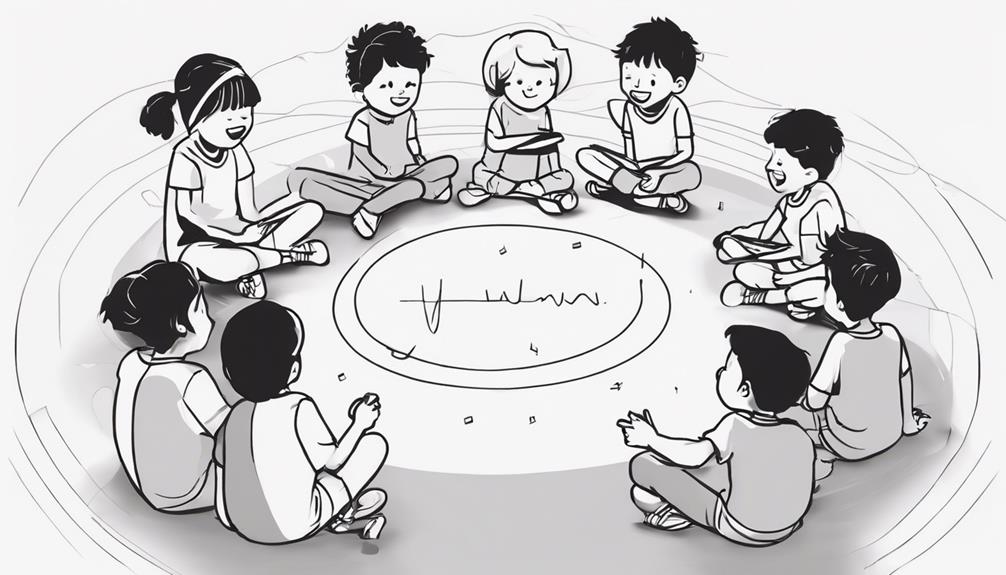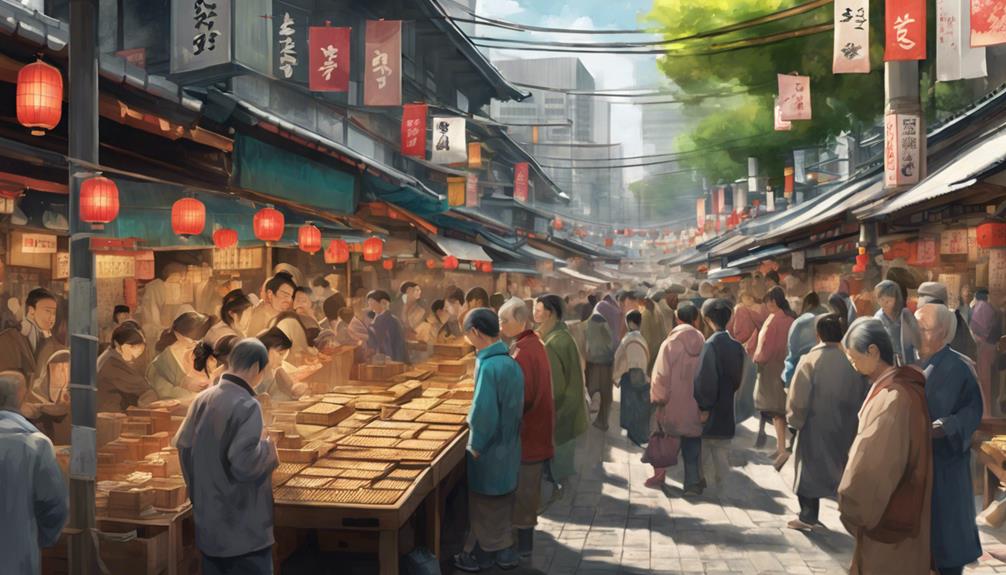Exploring the popular games enjoyed in different countries uncovers a tapestry of diverse traditions and values embedded in these recreational activities. From the rhythmic movements in Chile's Corre, Corre La Guaraca to the strategic stillness of Greece's Statues, each game offers a glimpse into the cultural fabric of its origin. As we unravel the threads of play that bind communities worldwide, intriguing insights emerge on how these games not only entertain but also educate and unite. Join us in uncovering the hidden gems of global play, where every game tells a story waiting to be discovered.
Key Takeaways
- Traditional games promote physical activity, cognitive skills, and cultural exchange.
- Games reflect cultural heritage, unity, and values unique to each country.
- Traditional games foster social interaction, camaraderie, and community bonding.
- Playing traditional games enhances skills, critical thinking, and preserves cultural practices.
Chile: Corre, Corre La Guaraca

Corre, Corre La Guaraca is a widely embraced traditional children's game in Chile that emphasizes agility and quick thinking to avoid being tagged by fellow players. This Popular game is a favorite among children of all ages in Chile, promoting physical activity and social interaction. The game's premise is simple yet engaging: players must outrun their opponents, using speed and strategy to evade being caught. Corre, Corre La Guaraca not only provides a fun and entertaining way for children to stay active but also fosters essential skills such as quick reflexes and decision-making under pressure.
In this game, participants learn the importance of staying alert and nimble, as being tagged means being out of the game. The competitive nature of Corre, Corre La Guaraca encourages children to push themselves physically while also developing their cognitive abilities. Overall, this traditional Chilean game serves as a valuable tool for enhancing both physical and mental skills in a playful and enjoyable manner.
Greece: Statues
The game of Statues in Greece involves players freezing in place when the music stops, similar to Freeze Dance in other cultures. This game tests participants' ability to react quickly to auditory cues and maintain stillness under pressure. The competitive aspect of being the last player to freeze adds an exciting element to social gatherings and events in Greece.
Greek Statues Game
A cherished childhood pastime in Greece, the game 'Statues,' or the Greek Statues game, is widely enjoyed for its blend of physical activity and quick thinking. This game, played by children across Greece, involves players freezing in place like statues whenever the designated player turns around during the game. The primary goal is to catch other players moving, leading to their elimination from the round. Ultimately, the last player remaining unfrozen emerges victorious in the game of Greek Statues. Through this entertaining game, children not only have fun but also engage in physical activity and develop quick reflexes.
- Encourages physical movement
- Enhances cognitive skills
- Fosters social interaction
Origins and Rules
Originating in the vibrant culture of Greece, the game of Statues captivates players with its unique blend of physical agility and mental acuity. This popular kids' game is a fun activity where players freeze in place like statues when the music stops, encouraging physical activity and creativity as they strike different poses. One player acts as the leader, controlling the music and trying to catch others moving. The last player to freeze without moving wins and becomes the next leader. 'Statues' is not only entertaining but also promotes listening skills and quick reflexes among participants. It is a beloved pastime that combines elements of playfulness and skill, making it a favorite among children worldwide.
Pakistan: Ounch Neech

Hailing from Pakistan, the traditional game of Ounch Neech captivates players of all ages with its strategic gameplay and cultural significance. This game, deeply rooted in Pakistani tradition, offers a fun and engaging experience while promoting critical thinking and social interaction among participants.
Key Aspects of Ounch Neech:
- Strategic Gameplay: Ounch Neech involves flipping a piece to determine the winner, requiring players to employ unique strategies to outwit their opponents.
- Cultural Significance: Beyond its entertainment value, Ounch Neech holds cultural importance in Pakistani society, reflecting the country's rich heritage and traditions.
- Educational Benefits: The game encourages players to think critically, make decisions strategically, and enhances interpersonal skills, making it a holistic activity for individuals of all ages.
With its blend of fun, strategy, and cultural relevance, Ounch Neech stands as a beloved pastime that continues to endure in the hearts of the Pakistani people.
Ghana: Pilolo
Pilolo, a traditional Ghanaian game, holds roots deeply embedded within the cultural fabric of the country. The gameplay of Pilolo requires participants to engage in strategic thinking and teamwork to uncover the hidden object, promoting both physical activity and social interaction. Beyond its recreational aspects, Pilolo serves as a significant cultural touchstone that unites communities and preserves Ghanaian traditions.
Pilolo Origins in Ghana
A traditional game deeply rooted in Ghanaian culture and cherished by both children and adults is Pilolo, revered for its emphasis on physical activity, strategic thinking, and community engagement. Pilolo's origins in Ghana date back generations, symbolizing more than just a recreational activity.
- Pilolo symbolizes the importance of physical wellness and mental acuity in Ghanaian society.
- The game serves as a cultural bridge, connecting individuals through shared experiences and values.
- Pilolo encapsulates the spirit of unity and cooperation, reflecting the communal ethos prevalent in Ghana.
These aspects contribute to Pilolo's enduring popularity and its role as a cultural touchstone in Ghanaian heritage, making it a game that transcends entertainment to embody the country's traditions and social fabric.
Pilolo Gameplay Description
Pilolo Gameplay Description sheds light on the intricacies of this traditional Ghanaian game, highlighting its significance in promoting physical activity, social interaction, and strategic thinking among participants. In Pilolo, players engage in a thrilling hide-and-seek activity with a small object like a stone or pebble. This game not only challenges the players' observation and memory skills but also encourages outdoor play and teamwork. By taking turns to hide and seek the object, participants enhance their strategic thinking and problem-solving abilities. Pilolo's simple yet engaging gameplay has stood the test of time, being passed down through generations, thus connecting players to Ghanaian cultural heritage. Its emphasis on physical activity, social bonding, and mental acuity makes Pilolo a cherished game among children and adults alike.
Pilolo Cultural Significance
With deep-rooted cultural significance, the traditional Ghanaian game of Pilolo embodies a rich tapestry of heritage and community engagement. Pilolo has been a popular game in Ghana since ancient times, serving as more than just a form of entertainment. It carries historical and social importance, symbolizing unity and togetherness among Ghanaians. The game's presence in the country's traditions highlights the value placed on physical activity, social interaction, and strategic thinking. Pilolo fosters a sense of community among players, both young and old, contributing to the preservation of Ghanaian cultural identity. This beloved game transcends mere recreation, offering a glimpse into the cultural fabric that has woven Ghanaian society together for generations.
Korea: Kongki Noli
Kongki Noli, a traditional Korean game played with 5 small stones, is a popular outdoor activity that enhances hand-eye coordination and dexterity skills while promoting social interaction and friendly competition. This game involves tossing and catching the stones in a specific sequence, challenging players of all ages to complete various sequences with skill and precision. As players aim to catch the stones on the back of their hand or transfer them between hands, they develop their motor skills and focus. Kongki Noli is deeply ingrained in Korean culture, reflecting traditional values and customs while providing a fun and engaging way to connect with heritage through gameplay. The game's popularity lies not only in its physical benefits but also in its ability to bring people together, fostering camaraderie and healthy competition in an outdoor setting. Overall, Kongki Noli serves as a reminder of the importance of preserving traditional games and cultural practices in the modern world.
United Kingdom: Pass the Parcel

Pass the Parcel, a widely embraced party game in the United Kingdom, adds an interactive and festive dimension to various gatherings, encouraging social engagement and anticipation among participants of all ages. The game involves passing a wrapped gift around a circle while music plays, with players taking turns unwrapping a layer. Here are some key points about Pass the Parcel:
- Engages participants of all ages in a fun and interactive activity during celebrations.
- Fosters social interaction as players eagerly await their turn to unwrap a layer of the parcel.
- Builds excitement and anticipation as the game progresses towards revealing the final gift.
Pass the Parcel has become a beloved tradition in British party culture, creating lasting memories and enjoyable experiences for everyone involved. Its simple yet engaging format makes it a popular choice for birthday parties, family gatherings, and other social events, highlighting the timeless appeal of this classic game in the United Kingdom.
Sumatra: Semut, Orang, Gajah
Originating from the rich cultural heritage of Sumatra, Indonesia, the traditional game Semut, Orang, Gajah offers a strategic and engaging pastime for players of varying ages. The name translates to 'Ant, Human, Elephant' in English, reflecting the close connection to local customs and traditional elements in Sumatra. Played by 2 or more participants, the game involves each player selecting one of the three elements – ant, human, or elephant – in a strategic move to determine the ultimate winner. Below is a table summarizing the gameplay of Semut, Orang, Gajah:
| Element | Beats | Loses to |
|---|---|---|
| Ant | Human | Elephant |
| Human | Elephant | Ant |
| Elephant | Ant | Human |
This structured approach to decision-making within the game enhances critical thinking skills while also providing an enjoyable experience rooted in Sumatra's cultural roots. The game's simplicity combined with its strategic depth makes it a popular choice for gatherings and leisure time in Sumatra, Indonesia.
Australia: Skippyroo Kangaroo
Skippyroo Kangaroo, a well-known game in Australia, captivates participants with its lively and engaging gameplay centered around mimicking the movements of the iconic Australian marsupial. This game has gained popularity for its ability to bring together individuals of all ages in a fun and active setting.
Key Points:
- Cultural Connection: Skippyroo Kangaroo embodies elements of Australian culture by showcasing the unique movements of kangaroos, promoting a sense of national identity among players.
- Physical Activity: The game encourages physical movement as players hop like kangaroos, fostering exercise and coordination skills in a playful manner.
- Interpersonal Interaction: Participants in Skippyroo Kangaroo enjoy a vibrant and energetic atmosphere, fostering social interaction and a sense of community among players.
Skippyroo Kangaroo stands out as a game that not only entertains but also promotes physical activity, cultural appreciation, and social engagement, making it a beloved pastime in Australia.
Frequently Asked Questions
What Are the Top 5 Games in the World?
In the global gaming landscape, the top 5 games are characterized by their prominence in esports tournaments, significant cultural impact, diverse player demographics, and extensive global reach. These games transcend borders and language barriers, uniting players worldwide in competitive and collaborative gameplay experiences. Their popularity underscores the universal appeal of gaming as a form of entertainment and social interaction, shaping the modern digital era in profound ways.
What Is the 1 Most Popular Game in the World?
In the realm of global gaming trends, one standout game has captured the hearts and screens of players worldwide, showcasing a significant cultural impact. This game, renowned for its immersive gameplay and expansive community, stands as a beacon of innovation and entertainment in the gaming industry. Its dominance is undisputed, setting the standard for cross-platform accessibility and engaging content. As the epitome of modern gaming excellence, this title reigns supreme as the most popular game in the world.
What Is the Most Popular Game in Our Country?
In exploring the most popular game in a specific country, factors such as gaming preferences and cultural influences play a pivotal role. Understanding local trends and the impact of online gaming within the region provide insights into the dominant game title. By analyzing these aspects, we can uncover the reasons behind the game's popularity and its resonance with the gaming community in that particular country.
What Games Do Children Play in Other Countries?
Traditional games played by children in various countries showcase the rich cultural diversity and unique play experiences across the globe. From 'Rayuela' in Chile to 'Zonaradiko' in Greece, and 'Kabaddi' in Pakistan, these games reflect different aspects of each society's traditions and values. Engaging in such activities not only provides entertainment but also fosters a sense of identity and community among the youth worldwide.
Conclusion
In conclusion, popular games in various countries offer children the opportunity to engage in physical activity, social interaction, and skill development while celebrating cultural heritages. From Chile's Corre, Corre La Guaraca to Australia's Skippyroo Kangaroo, these games provide valuable learning experiences and promote a sense of community among children. Embracing the diversity of games across different countries can foster a greater appreciation for global traditions and promote cross-cultural understanding.
